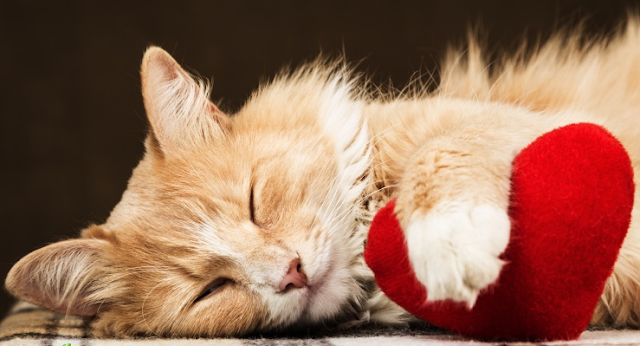The Real Reason Why Cats Purr
Cats, as the old saying goes, were once worshiped as gods and have never allowed the world to forget it. And why not? They're adorable, and who cares if they show a little sociopathic behavior every so often? Cuteness will get you out of a lot, but their standoffish nature and refusal to participate in behavioral studies (like their canine counterparts often do) means that we know surprisingly little about what's going on inside a kitty's mind. We do think that there's quite a lot happening in there, though, because they're just fascinating little heart-stealers.
No one's sure when cats first moved into our homes and our hearts, but the most commonly repeated trivia tidbit is that it happened in ancient Egypt around 4,000 years ago. There's other evidence that suggests it happened well before that, with remains of a human and cat buried together dating back 9,500 years. Cats in China were keeping homes rat-and-mouse-free (and sharing leftovers) around 5,300 years ago, so no one's exactly sure when the mysterious cat showed up and volunteered their services, and we're pretty sure that's how they plan on keeping it.
By comparison, dogs have been at our sides for around 40,000 years, and over those years we've selectively bred dogs to fill certain roles, from hunting and herding to sitting in purses. Cats, on the other hand? They're … cats. Sure, there's breeds of cats, but they're more or less cat-shaped. There aren't cats that specialize in herding or mousing or … well, to be fair, they're all specialists in being gods and goddesses.
When scientists took an up-close-and-personal look at their DNA, they found there's an incredibly good reason for this: they're pretty much not domesticated, at least, on a genetic level. Sure, there's the troll that says, "Clearly, they're domesticated, I'm not letting a filthy wild animal in my house." You'd be at least partially wrong, Troll. Genetically, our domestic housecat still has most of their DNA in common with their wild cousins, and unlike dogs (who have gotten rid of most of the unsavory behavior of wolves), cats have kept their wild instincts, too. Just ask anyone who's walked outside to enjoy a nice, warm spring day and stepped in disemboweled rodent.
No one's sure when cats first moved into our homes and our hearts, but the most commonly repeated trivia tidbit is that it happened in ancient Egypt around 4,000 years ago. There's other evidence that suggests it happened well before that, with remains of a human and cat buried together dating back 9,500 years. Cats in China were keeping homes rat-and-mouse-free (and sharing leftovers) around 5,300 years ago, so no one's exactly sure when the mysterious cat showed up and volunteered their services, and we're pretty sure that's how they plan on keeping it.
By comparison, dogs have been at our sides for around 40,000 years, and over those years we've selectively bred dogs to fill certain roles, from hunting and herding to sitting in purses. Cats, on the other hand? They're … cats. Sure, there's breeds of cats, but they're more or less cat-shaped. There aren't cats that specialize in herding or mousing or … well, to be fair, they're all specialists in being gods and goddesses.
When scientists took an up-close-and-personal look at their DNA, they found there's an incredibly good reason for this: they're pretty much not domesticated, at least, on a genetic level. Sure, there's the troll that says, "Clearly, they're domesticated, I'm not letting a filthy wild animal in my house." You'd be at least partially wrong, Troll. Genetically, our domestic housecat still has most of their DNA in common with their wild cousins, and unlike dogs (who have gotten rid of most of the unsavory behavior of wolves), cats have kept their wild instincts, too. Just ask anyone who's walked outside to enjoy a nice, warm spring day and stepped in disemboweled rodent.




No comments